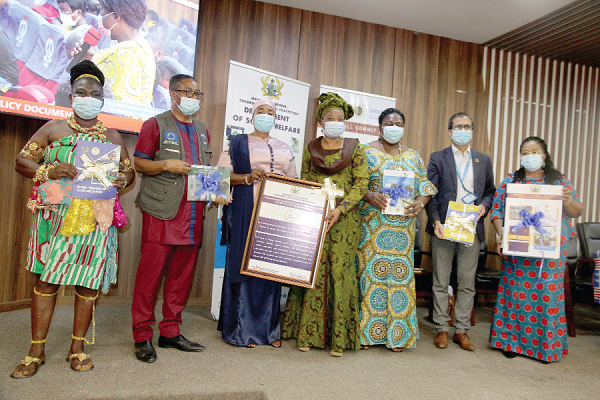
Social Welfare Department launches initiative - To protect vulnerable children
Ten documents to help strengthen child protection services in the country have been developed and launched in Accra.
Developed by the Department of Social Welfare (DSW) of the Ministry of Gender, Children and Social Protection in collaboration with the Ghana Statistical Service and the Judicial Service, with support from UNICEF and the United States Agency for International Development (USAID), the documents are aimed at helping social welfare officers better handle cases of children in need of alternative arrangements and also to improve standardised childcare practices within residential homes.
The Deputy Minister of Gender, Children and Social Protection, Ms Lariba Zuweira Abudu, launched the 10 documents on behalf of the sector minister, Ms Adwoa Safo.
The documents are Children living in Residential Care in Ghana: Findings from a Survey of well-being; The Social Welfare Service Workforce Capacity Assessment and Capacity Building Strategy for Social Welfare Services Workforce: Probation Manual; Guidelines for Deinstitutionalisation of Residential Homes for Children and Training Manual for Caregivers of Children with Disabilities.
The rest are National Standards for Foster Care in Ghana; Special Guidance for Child Protection Case Management, Social Welfare Service Workforce Strategy Assessment, Capacity Building Strategy for Social Welfare Strategy and Strategic Plan for the Department of Social Welfare.
Robust legislative framework
According to the deputy minister, Ghana had developed robust legislative framework to protect children and their rights and mentioned the Children’s Act, 1998 (Act 560), the Children’s (Amendment) Act, 2016, the Human Trafficking Act, 2005 (Act 694) and the Domestic Violence Act, 2007 (Act 732) .
Others she said were The Child and Family Welfare Policy (2015); the Juvenile Justice Act, 2003 (Act 653); and the Justice for Children Policy (2015).
Ms Zuweira said the ministry recognised the family, pursuant to international and local legal frameworks, including the Constitution of Ghana as the fundamental unit of society and the natural environment for the growth and well-being of all its members, particularly children.
The 10 policies and strategies for interventions, which were launched, she said had been developed and documented for a standardised approach in handling cases concerning the child and family’s welfare.
The Chief Director for the Ministry of Gender, Children and Social Protection, Dr Afisah Zakaria, in a remark called on stakeholders to help in the implementation of the documents, saying the ministry “cannot implement these documents without you.”
Partnership
The acting Health Office Director, USAID, Mrs Mary Mensah, also remarked that the launch of the documents represented significant policy efforts, saying, “while we are celebrating a milestone achievement, there is still hard work ahead.
“We must all work together to ensure that social welfare officers and caregivers adhere to these manuals, guidelines, tools and regulations to provide quality services for vulnerable children across the country,” she said.
For his part, the UNICEF Chief - Child Protection, Mr Muhammad Rafiq Khan, was hopeful that the documents would help in protecting vulnerable children across the country.
The Director, DSW, Rev. Dr Mrs Comfort Asare, bemoaned the fact that Ghana had as many as 141 residential homes with 3,530 children, describing it as alarming and shocking and called for more support to ensure that children were rather put in family based care instead of foster homes.
